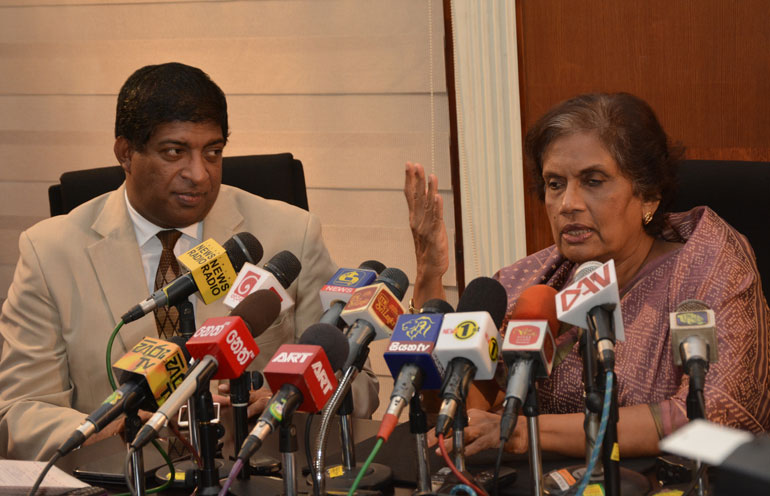Friday Feb 20, 2026
Friday Feb 20, 2026
Saturday, 13 June 2015 00:52 - - {{hitsCtrl.values.hits}}
 Former President Chandrika Bandaranaike Kumaratunga gestures at the press conference yesterday as Finance Minister Ravi Karunanayake looks on – Pic by Upul Abayasekara
Former President Chandrika Bandaranaike Kumaratunga gestures at the press conference yesterday as Finance Minister Ravi Karunanayake looks on – Pic by Upul Abayasekara
By Charumini de Silva
The theoretician of the 8 January ‘silent revolution,’ former President Chandrika Bandaranaike yesterday spokeon the state of the economy and the illegal projects embarked onby the previous regime.
Addressing the media at a special press conference organised by the Finance Ministry, she signalled that there were many investments waiting to come to Sri Lanka soon after the general election.
“The investors have come and discussed possible investment opportunities in Sri Lanka, but they are just waiting till the elections are over.I personally know that there are very successful investors are marking time to enter Sri Lanka, but these are not my friends,” she added.
She also hinted to Finance MinisterRavi Karunanayake that soon after the election, a reasonable sum of money would come to the Treasury as FDIs.
Bandaranaike said that during the previous regime when she had problems staying in the country she worked in many international organisations as an advisor, and one of the major complaints was that all bureaucrats were corrupt and asked for commissions for each project in which the country got involved.
“I met a lot of European and US investors who have come to invest in Sri Lanka, but they were all very disappointed with the way the Sri Lankan bureaucrats treated them.”
She also pointed out that Sri Lanka did not receive aid from the Western world as the country did not have democracy and fundamental rights in order.
“We did not receive aid from our major donors from the Western world and received a very little aid from Japan. However, with democracy being established in the country, they all are now negotiating with the Finance Ministry. I think the aidgroup meeting will be held in Colombo soon after the general election,” she noted.
Commenting on the illegal projects the previous regime embarked on, Bandaranaike said that they were all pillaging public wealth.
Citing an example, she said that the Mahinda Rajapaksa regime had launched a drinking water supply scheme worth Rs. 560 billion, Rs. 750 billion or more on road development projects and there were many more projects that they had embarked on which had not followed the due process.
“This is like someone going to a shop and purchasing the whole shop without having a single cent in their hand.”
She noted that a lot of these projects had been launched during the last year on the assumption a presidential election would be held by end 2014. These projects have been now stopped as there are no funds allocated to carrythem outfurther.
One of the key concerns of the investors were that project costs were much higher than they should be and as a result, the country lost many good investment opportunities.
She went on to say that the previous regime borrowed loans at very high rates of 9% whereas the norm was to borrow at around 2%.
“The majority of these borrowings were from China at very high rates. Now the Government is renegotiating and trying to bring it down. Sovereign governments have the right to break any of these agreements, but I do not think this Government wants to act in an irresponsible manner.”
Lashing out at the Mahinda Rajapaksa regime, she said that they had signed agreements without going through accepted tender procedures, so it was illegal and could be very easily cancelled.
“We do not want to affect the companies that have come in. They are renegotiating the terms to bring down the prices to the levels at which they should stand.”
Reuters: The rupee fell to a record low on Friday as a State-run bank, through which the Central Bank directs the markets, lowered the dollar selling rate by 20 cents, dealers said.
Central Bank Governor Arjuna Mahendran said late on Thursday the country should let market forces determine its rupee exchange rate and warned that trying to buck the global trend of a rising dollar is “suicidal”.
Currency dealers said hope that the rupee would strengthen on rising inflows was fading as the currency has come under pressure due to a strong US currency, political uncertainty ahead of a Parliament poll and foreign selling in rupee bonds during the last few days.
The spot currency ended at 134.00 per dollar, weaker from Thursday’s close of 133.80.
“The Central Bank lowered the spot by 20 cents, now the State bank is selling dollars at 134 (rupees per dollar),” a currency dealer said on condition of anonymity.
Two other dealers confirmed the move. Officials from the Central Bank were not immediately available for comments.
On Tuesday, the State-run bank cut the spot rupee’s level by 10 cents to 133.80 after retaining it at 133.90 during the previous five sessions through Monday.
The move came amid tepid dollar sales by exporters and the continuing political uncertainty, dealers said.
The market expects the rupee to be stable as long as the Central Bank offers dollars, but its stability will depend on inflows into the country, currency dealers said.
Finance Minister Ravi Karunanayake said on Thursday that Sri Lanka is planning to borrow $1 billion via five-year syndicated loans as early as this week from international banks and it could borrow up to $2 billion.
One-week forwards ended at 134.15/35 per dollar weaker from Thursday’s close of 133.95/134.10, while actively traded three-month forwards ended at 135.90/136.00 per dollar compared with Thursday’s close of 135.70/90.